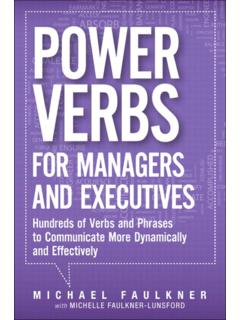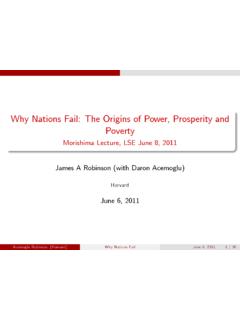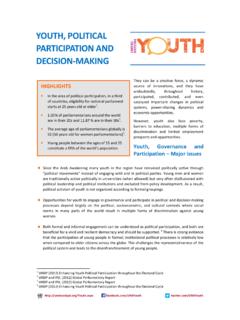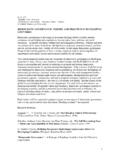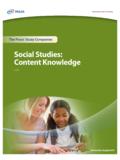Transcription of 2472 WLP LTC ENG - Women's Learning Partnership
1 ALeadership TrainingHandbook forWomenLeading to ChoicesLEADING TO CHOICESL eadership is the ability to implement dreams. Workshop participantLeading to Choices: A Leadership Training Handbook for Womenwill be avaluable tool for women s empowerment all over the world. While it reflects importantideas about leadership from other sources, it combines them with new insights in a wayuniquely accessible and useful to women. In particular, no other such manual I haveseen offers itself to self-adaptation and self-application by people of all kinds (includingmen), respecting the diversity of their needs and situations. Furthermore the non-authoritarian approach of the book models the very kind of leadership it recommends. Nancy Flowers, author and human rights educatorI have now come to understand that even ordinary women can be leaders, and thisis very empowering. Literacy teacher in a Morocco leadership workshopIf we don t see ourselves as leaders and are not discussed in the literature as leaders,then how will others see us as leaders?
2 Domestic worker in a Jordan leadership workshopIn this training, I found that I have leadership skills that I did not know I had before. Young woman in a Palestine leadership workshopIf all of civil society looks at leadership in this way and evaluates and participates withothers in discussing how leadership is going to open up participation and choice, thenmany of our problems will be solved. Male participant in a Jordan leadership workshopI realized I had visions inside of me that I could achieve and I was empowered to goahead and achieve them. Woman activist in a Nigeria leadership workshopI believeLeading to Choicesis a seminal work that will greatly impact the field ofwomen s human rights and empowerment.. It will help more than one generationof women think of themselves as leaders within their own societies and cultures. This iswhat I hope to achieve for Afghan women and girls through a collaborative programwith WLP in Pakistan.. The leadership handbook that WLP has created in partnershipwith other NGOs in the Global South is an invaluable model for participatory andcollaborative leadership training and capacity building.
3 Sakena Yacoobi, founder of the Afghan Institute of LearningLEADING TOCHOICESA LEADERSHIPTRAININGHANDBOOKFORWOMENM ahnaz AfkhamiAnn EisenbergHaleh Vaziriin consultation withSuheir AzzouniAyesha ImamAmina LemriniRab a NaciriWomen s Learning Partnership for Rights,Development, and Peace (WLP)4343 Montgomery Avenue, Suite 201 Bethesda, MD 20814, USATel: 1-301-654-2774/Fax: 1-301-654-2775 Email: collaboration withAssociation D mocratique des Femmes du Maroc (ADFM)Secteur les Orangers, Rue Mokla, Villa No2 Rabat, Morocco Tel: 212-37-737165/Fax: 212-37-260813 Email: for Women s Human Rights232A Muri Okunola Street, Box 73630 Victoria Island, Lagos, Nigeria Tel: 234-1-320-0484 Tel/Fax: 234-1-262-6267 Email: s Affairs Technical Committee (WATC)Awad Bldg., Radio Street, 2nd Box 2197 Ramallah, Palestine via Israel Tel: 970-2-298-7783 Fax: 970-2-296-4746 Email: 2001by Women s Learning Partnership for Rights, Development, and Peace (WLP)ISBN 0-9710922-0-6 Design:Xanthus DesignIllustration:Avish KhebrehzadehCopy Editing:Castle Pacific PublishingAcknowledgementsiPreface: Who We AreiiiIntroduction: Premises, Purposes, Objectives, and Structure1 The Building Blocks of Leadership: Leadership as Communicative Learning5 Communicating in a Workshop Setting: Guidelines for Facilitating 17 Workshop SessionsPart I: Developing the Self for Leadership27 Session 1: Who Is a Leader?
4 29 Session 2: How Am I a Leader in My Own Life? 35 Session 3: What Is My Vision?43 Part II: Communicating With Others 49 Session 4: How Should We Communicate?51 Session 5: How Can We Serve Diverse Interests? 57 Session 6: How Will We Empower Each Other? 63 Part III: Creating Learning Partnerships69 Session 7: How Will We Find Shared Meaning?71 Session 8: What Is Our Plan of Action? 77 Session 9: How Do We Cultivate Our Skills and Talents? 83 Session 10: How Do We Mobilize for Action? 89 Session 11: How Do We Share Responsibilities and Results?95 Session 12: How Do We Define a Successful Organization?101 Participant & Facilitator Evaluation Form107 Appendices111 Appendix A: Alternative Scenarios 113 Appendix B: Facilitation Tactics 127 Appendix C: Participative Listening 131 Appendix D: Resources on Leadership133 Appendix E: Organizations on Leadership137 Appendix F: International Advisory Council141 TABLE OFCONTENTSWe owe a debt of gratitude to numerous organizations and individuals whoseassistance made this project possible.
5 We are grateful to the Ford Foundation,National Endowment for Democracy, The Shaler Adams Foundation, and the TidesFoundation for their support in our campaignto develop ways and means ofenhancing women s leadership thank the leaders who provided the inspirational stories for our handbook,especially Zainah Anwar, Thais Corral, Ayesha Imam, Ivy Josiah, Asma Khader, andSakena Yacoobi who personally shared their stories with us. We are grateful to Nancy Flowers who carefully reviewed drafts of this manuscript and providedinvaluable expertise and insights. The Women s Learning Partnership for Rights, Development, and Peace (WLP)launched this project on June 2, 2000 when we convened a group of experts to discuss with us new approaches to women s leadership and local needs andpriorities for its development. We would like to thank our funders who made thismeeting possible: The General Board of Global Ministries of the United MethodistChurch, The Global Fund for Women, the San Francisco Foundation, the UnitedNations Development Fund for Women (UNIFEM), and the United Nations PopulationFund (UNFPA).
6 In attendance at this meeting were Alia Arasoughly, Shiva Balaghi,Janice Brodman, Sylvie Cohen, Thais Corral, Naadia Davis, Nancy Flowers, LeanneGrossman, Ayesha Imam, Bushra Jabre, Mona Kaidbey, Amina Lemrini, Vivian Manneh,Pramada Menon, Geeta Misra, Thoraya Obaid, Ayo Obe, Aruna Rao, Najat Rochdi,Susan Deller Ross, Rahim Sabir, and Sakena Yacoobi. Many of these experts alsoserve on our International Advisory Council (see Appendix F). We are indebted tothem for their input and support throughout every stage of this are due to Rakhee Goyal, Hanan Kholoussy, and Sian MacAdam whocontributed many ideas andassisted with all stages of the development of themanuscript. We also thank Maureen Donaghy and Megan Brown who helpedorganize the various expert meetings, advisorycouncil gatherings andcommunication between collaborators. ACKNOWLEDGEMENTS iiiiThis handbook was produced collaboratively by the Women s Learning Partnership for Rights, Development, and Peace (WLP) and its partner organizations AssociationD mocratique des Femmes du Maroc (ADFM) in Morocco, BAOBAB for Women sHumanRights (BAOBAB) in Nigeria, and the Women s Affairs Technical Committee(WATC) in Palestine.
7 Our challenge was to work across three continents to create a handbook that contained a shared vision and agenda for women s leadership,accommodated diverse opinions, and reconciled a variety of objectives. Leading toChoices: A Leadership Training Handbook for Womenengages the ideas and skillsof dozens of women and men non-governmental organization directors and staff aswell as scholars, political leaders, jurists, and development practitioners in over fifteen launched this project in New York City on June 2, 2000. In the months thatfollowed, WLP established formal Partnership agreements with ADFM, BAOBAB,and WATC all non-governmental organizations committed to strengthening women sempowerment, participation, and leadership in their communities. Each of these fourorganizations extensively reviewed and critiqued drafts of this handbook at everystage, contributed to its strategy, design, and content, and evaluated it for effectiveness,relevance, and cultural to Choicesis a prototype handbook that is customized and adapted forlocal use in workshops in Africa, Asia, and the Middle East.
8 Participants in theseworkshops are the staff and constituents of the partner organizations as well asstudents, professional women, government employees, teachers, and politicalactivists, among others. Field project coordinators undertake the process ofcustomizing Leading to Choicesfor each community. They direct the local testingprocesses, assess the relevance and cultural appropriateness of content, and facilitatethe development of additional material that is locally useful. The final country-specific leadership handbooks are language/idiom, culture, and issue appropriatelearning tools women may use to develop participatory leadership :WHOWEAREivLeading to Choices: A Leadership Training Handbook for WomenAbout the CollaboratorsWomen s Learning Partnership for Rights, Development, and Peace (WLP):WLP is an international, non-governmental organization that seeks to empower womenand girls in the Global South to re-imagine and re-structure their roles in their families,communities, and societies.
9 WLP achieves this goal through forming partnershipswith women s organizations in the Global South, creating leadership training curriculumand materials, and engaging women in the production of information and produces culture-specific multimedia tools for radio, video/television, CD-ROM,and the Internet that strengthen women s participation and leadership in buildingcivil D mocratique des Femmes du Maroc (ADFM):ADFM was established in1985 as an independent association to defend and promote the human rights of women,and to foster equitable policies and social practices. As one of the largest NGOs inMoroccofocused on the rights of women, ADFM has been successful in formingnetworks with governmental and civil society institutions regionally and aims to reinforce the rights of women through advocacy, awareness raising,literacy campaigns, and education. In particular, ADFM has created a Center forFemale Leadership, which seeks to increase women s participation at all levels for Women s Human Rights (BAOBAB):BAOBAB is a non-profit, non-governmental organization working for women s human rights and legal rightsunder religious, statutory and customary laws, especially those geared toward Muslimwomen.
10 BAOBAB works with legal professionals and paralegals, policy makers,women s and human rights groups, other NGOs, and members of the general programs promote human rights education and particularly women s human sponsorswomen s rights training and education projects, and programs toenhance understanding of women s rights with a view to influencing social andgovernment s Affairs Technical Committee (WATC):WATC is a coalition of women affiliatedwith five political parties in Palestine, six women s studies centers, local and internationalhuman rights organizations, and many politically independent professional in 1992, WATC works to eliminate discrimination against women in thepursuit of a well-established, democratic society that respects human rights. The aimsand objectives of WATC include developing young women s leadership skills, increasingwomen s political participation at all levels, and empowering and supporting existingwomen s rights organizations. WATC achieves its objectives through training, networking,advocacy, campaigning, and an educational media : PREMISES, PURPOSES, OBJECTIVES, ANDSTRUCTUREP remisesThe concepts and Learning exercises in this handbook are based on four first is that in most communities, men are perceived as dominant andwomen as assumption is complex because concepts like dominance,power, and leadership do not have the same meaning across cultures and within communities individuals may value various human characteristics orinteractions instance, resolving a dispute between two neighbors witha well-placed punch may seem to some to demonstrate weakness on the part of theperson throwing the punch.

